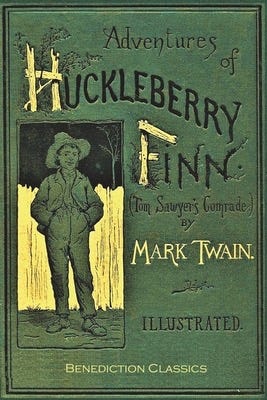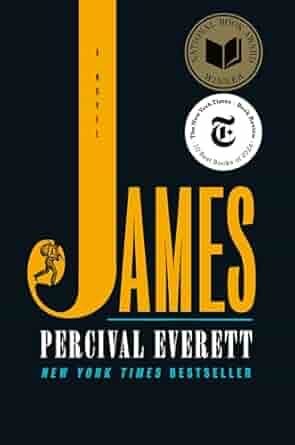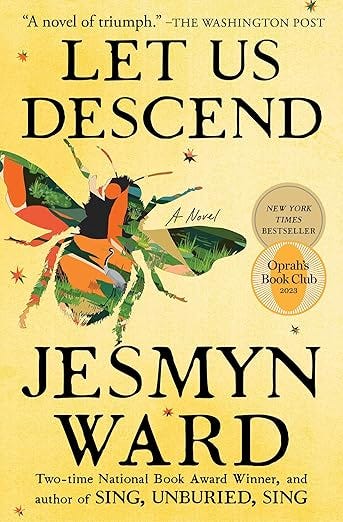What’s the Game James?
Percival Everett’s Derivative Work and a Treat By Jesmyn Ward
What makes a book compelling? Join me in developing our “Eyes and Ears” for finding compelling stories.
In Mark Twain’s Adventures of Huckleberry Finn, Huck Finn and Jim the slave run away together on an adventurous float trip down the Mississippi. Huck flees his abusive, drunk Pap, Jim flees the prospect of being split from his family and sold. They travel separately until they bump into each other on an island. Jim is barely subsisting:
“Why, how long you been on the island, Jim?”
“I come heah de night arter you’s killed.”
“What, all that time?”
“Yes—indeedy.”
“And ain’t you had nothing but that kind of rubbage to eat?”
“No, sah—nuffn else.”
Not enslaved to the story of Huck Finn, Percival Everett, writing derivatively in his James, takes free reign in deviating. Here is Everett’s rewrite, changing of the plot, shifting the first person perspective from Huck to Jim:
“…What you be doin’ on dis ilan? And why you got blood all over you?”
“I kilt myself,” the boy said.
I looked him over. “You didn’t do a good job.”
. . .
“I kilt a pig and spread his blood all round Pap’s cabin. I made a mess like there had been a fight in there.”
In my head I was doing the math. Huck was supposedly murdered and I’d just run away. Who did I think they would suspect of the heinous crime?
Everett shifts Huck’s feigned death in time from before Jim left for the island (not a suspect in Huck’s feigned demise) to after (possibly a suspect). He does so to add conflict, up the stakes for Jim.
In other words, there’s no need to read Huck Finn in conjunction with James. Too many differences.
As the excerpt shows, the new Jim thinks differently than he speaks to the likes of Huck—heinous crime. We’re jarred by the switch between inner dialogue and outer dialog, educated talk to slave talk. It’s an interesting take on slavery. Imagine the storm that would blow if the whites discovered one of the slaves, the oppressed, was better educated than they.
Throughout the story, Jim/James seeks to be treated as a man, not as property, and his elevated language is the means to accomplishment. The take would fall flatter on some other book; part of what makes Huckleberry Finn stand alone in American literature is Twain’s heavy use of dialect, making it a difficult read to wade through. Huckleberry Finn is about the illiterate, meant to be read by the literate. Everett’s minimal use of illiterate dialect, having James’ speech match modern day, makes for easier reading.
However, the most jarring aspect of James isn’t that Jim/James is a self-educated man trapped in a slave’s situation and speaks better than Huck Finn and most the white folk around him.
The most jarring aspect of James is the lack of bonding between the two main characters. They’re on a road trip after all, confined at times to an island, a canoe, a raft, facing one hardship after another. Perfect conditions for two very different people coming together in mind if not in relationship.
I was happy enough to send Huckleberry off on his mission to the mainland. My pleasure in seeing him off was threefold. If he was unsuccessful and discovered, he might be accused of having helped me escape, rather than my being seen as a runaway. And I might no longer be suspected of his murder and/or kidnapping, the punishment for either being torture and death. Finally, if Huck was able to find his way back without detection, he could bring me much desired and needed news of my family’s condition.
Huck’s a kid and here James uses him as a means to an end. Granted, James is a slave and worried about catching the blame for Huck’s demise, but the story never seems to break from this, never has the two connect on their arduous trip down the river. This is especially relevant as the story unfolds and we’re well into the book. Lacking foundation of a burgeoning friendship, the surprise that comes seems a bit forced and diminishes the aha moment.
A couple of us in our book club came away with the impression that James is not only self-educated—we learn he became so on the sly—he’s academic in a modern sense. For example, nobody in the 1800s used and/or. And like many modern academics, he’s long on words, short on real world application. Again, granted, he’s a slave in a tight situation as a runaway, but there’s little sense that James uses his smarts to get himself out of his predicaments, much less strive for a modicum of a better life. Part of the dialog schtick is the game slaves play, talking slave for the whites, college-educated amongst themselves (left unexplained is how other slaves learned to talk educated). There’s no room for progenic street rappers in James; different genre apparently. Yet, James seems incapable of bridging academia to his life; his interactions with fellow slaves are shallow, deep with an imaginary John Locke (I persoinally aint knows Locke, I has ta look him aup. Hees some guy who last seen daylight in 1704).
Still though, diminutive starchy tubers in the overall enlargement of the story.
Let Us Descend by
offers another take on the trauma and grief of slavery from a slave’s perspective. Anis’ mother is taken from her daughter and sold south. Anis embarks on her own road trip, in this case walking across the south.How lucky are we to have the choice to read two fine works of literature.
All the Best,
Geoff
If you enjoyed this post, please hit the heart “❤️” so others can find it. It’s at the bottom and at the top.





John Locke is known as the father of liberalism. Even in vague terms these ideas would appeal to James. The book was a dusty volume in the doctor’s library?